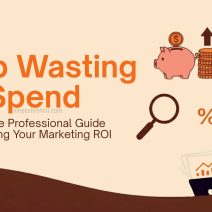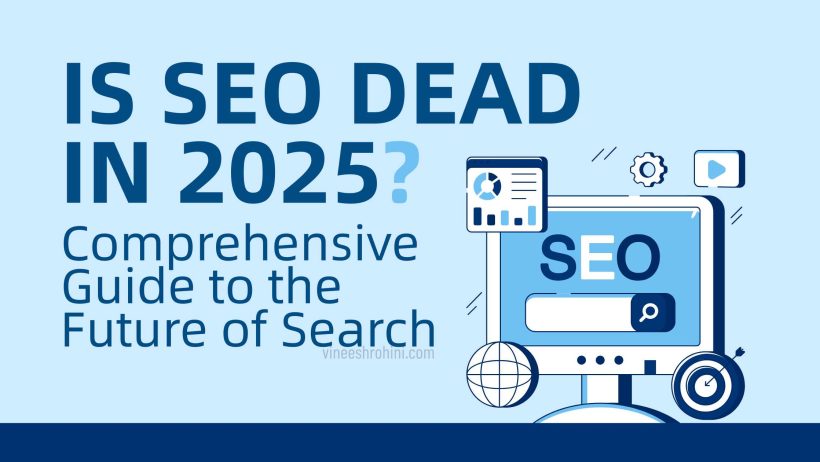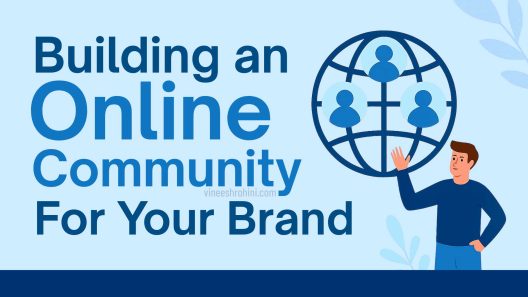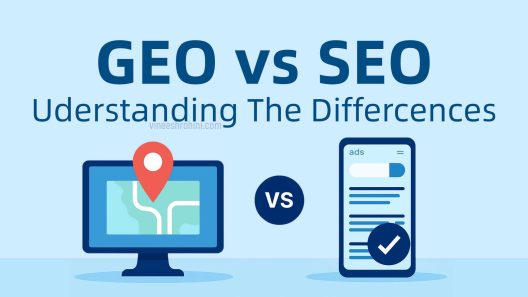Is SEO Dead in 2025 : Search Engine Optimization, or SEO, has been the backbone of digital visibility for over 20 years. Yet, every time a major technological shift occurs, a familiar debate resurfaces—is SEO dead? In 2025, with Artificial Intelligence (AI), generative search engines, voice assistants, and alternative discovery platforms reshaping how people find information, the debate has reached new heights.
Table of Contents
But let’s cut through the noise: SEO is not dead in 2025. It has simply evolved. It is no longer about gaming algorithms with keyword stuffing or buying thousands of backlinks. Instead, SEO is now about delivering relevant, authoritative, and user-centric content that meets searchers’ intent across devices, channels, and platforms.
In this essay, we’ll explore why some people claim SEO is dead, how the practice has transformed over the years, the impact of AI and generative search, proven strategies that still work in 2025, and what the future holds for businesses relying on organic visibility.
Why People Believe SEO Is Dead

Before proving SEO’s survival, it’s worth understanding why so many people think it’s a lost cause.
1. The Rise of AI-Powered Search
Generative AI platforms like ChatGPT, Perplexity AI, and G’s SGE (Search Generative Experience) are changing how people consume information. Instead of scrolling through ten blue links, users now get direct AI-generated answers. For many businesses, this means fewer website clicks, leading them to believe SEO no longer matters.
2. Paid Ads Take Over Top Results
G, Bing, and other search engines are businesses. They rely heavily on advertising revenue. In 2025, sponsored ads often take up the first screen of results on both desktop and mobile. Small businesses sometimes feel SEO cannot compete with these ads.
Also Read : Hyperlocal SEO : Winning Small Local Markets for Higher ROI : Comprehensive Guide 2025
3. Algorithm Fatigue
G makes thousands of algorithm adjustments every year. From Panda and Penguin in the past to Helpful Content Updates today, these constant changes frustrate businesses that struggle to keep up. When rankings drop, many mistakenly assume SEO no longer works.
4. Alternative Search Platforms
Gen Z and Gen Alpha increasingly turn to Insta Reelsand even Y T Shorts for search queries. This behavioral shift fuels the narrative that SEO—traditionally associated with G —is outdated.
While these points have merit, they don’t prove SEO is dead. They simply highlight that SEO is evolving, just as it always has.
The Evolution of SEO: From Keywords to User Experience

SEO’s history proves it has never been static. Instead, it evolves with every new technology and consumer shift.
- 1990s–Early 2000s: Keyword Domination
SEO meant stuffing keywords into meta tags, titles, and content. Whoever repeated “buy shoes online” the most won. - 2010–2015: Quality Control Era
G’s Panda, Penguin, and Hummingbird updates cracked down on spammy tactics. SEO began prioritizing content quality, trustworthiness, and link relevance. - 2016–2020: Machine Learning Takes Over
With RankBrain and BERT, G started understanding intent and context. Marketers had to focus on semantics and natural language. - 2021–2024: Experience & Trust
Core Web Vitals, mobile-first indexing, and E-E-A-T (Experience, Expertise, Authoritativeness, Trustworthiness) became central ranking factors. - 2025 and Beyond: AI-First SEO
Search engines now rely heavily on generative AI. SEO is about answering questions directly, earning AI citations, optimizing structured data, and providing human-first content.
Why SEO Is Still Alive in 2025
Despite the shifts, SEO continues to thrive for several reasons:
1. Organic Search Still Dominates Traffic
Research shows 53% of website traffic globally still comes from organic search. Paid ads may capture quick clicks, but users overwhelmingly trust organic results.
2. Search Is Still the Gateway
Even with AI, voice, and social discovery, most customer journeys begin with a search query. If your brand is absent, you’re invisible.
3. Trust and Authority
SEO builds long-term credibility. A website ranking on page one is seen as more reliable than a business invisible on G.
4. Cost-Effectiveness
While ads stop delivering results the moment you stop paying, SEO compounds over time. An optimized blog can rank for years, bringing in leads without additional spend.
5. Adaptability to New Tech
SEO is not limited to G. Optimizing for YT, Amazon and AI platforms is still SEO—just in a modern form.
SEO in the Age of Generative AI

The biggest evolution in 2025 is Generative Engine Optimization (GEO). This is the process of optimizing content not just for humans, but also for AI tools that generate summaries and answers.
Key Shifts with GEO:
- Featured Snippets and AI Summaries: AI often pulls data from high-authority sites. Businesses must aim to become the cited source.
- Schema and Structured Data: Rich metadata helps AI understand context, increasing chances of being referenced.
- Conversational Queries: With natural language search, content must directly answer long-form questions.
- Brand Mentions: AI rewards brands consistently mentioned across the web as reliable sources.
Effective SEO Strategies That Work in 2025
Businesses succeeding with SEO in 2025 focus on strategies that align with both AI and human behavior.
1. Content Depth and Authority
Thin blogs no longer cut it. In-depth guides, research-backed insights, and unique perspectives win.
2. Voice Search Optimization
With 50%+ of searches voice-driven, optimizing for conversational queries like “Which is the best smartphone under 30,000 in India?” is essential.
Buy Now : Ecommerce Website
3. Local SEO and Hyperlocal Targeting
“Near me” searches have exploded. Businesses must optimize their G Business Profiles, gather reviews, and ensure NAP (Name, Address, Phone) consistency.
4. Visual and Video SEO
YT and Insta reels are search engines in themselves. Using optimized descriptions, transcripts, and hashtags boosts discoverability.
5. AI-Powered SEO Tools
Marketers now rely on tools like SurferSEO, Jasper, Clearscope, and SEMrush’s AI integrations to optimize faster and smarter.
6. User Experience and Core Web Vitals
A fast-loading, mobile-friendly, secure site is non-negotiable. Search engines reward seamless experiences.
Case Studies of SEO Success in 2025

Case Study 1: Local Business Growth
A family-owned restaurant optimized for voice search and local SEO. By targeting queries like “best pizza near me,” they appeared on Siri and G Assistant. Revenue increased 30% in six months.
Case Study 2: E-commerce Brand with Visual Search
An online apparel brand optimized its product catalog with structured data for G Lens. Within 8 months, organic traffic rose 40% and sales jumped significantly.
Case Study 3: B2B SaaS Lead Generation
A software company invested in long-form AI-friendly guides. Their content frequently appeared in G’s generative summaries, doubling leads without paid ads.
The Future of SEO Beyond 2025

SEO will continue to evolve, but the core principle remains: connecting people with the information they seek. Here’s what lies ahead:
- Personalized SEO: Search results tailored uniquely to each user based on behavior, preferences, and context.
- Screenless SEO: With wearables, AR glasses, and IoT devices, search won’t always involve a traditional screen.
- Metaverse Search: Optimizing for discovery inside virtual environments.
- Sustainability Signals: Eco-friendly brands may gain ranking advantages as consumer priorities shift.
Is SEO Harder in 2025?
Yes—but in a good way. The era of shortcuts is gone. Businesses cannot simply buy backlinks or stuff keywords and expect results. SEO now demands:
- A deep understanding of user intent.
- Continuous monitoring of AI-driven results.
- Investment in high-quality, original content.
- Collaboration across SEO, content marketing, social, and paid teams.
In other words, SEO success requires strategy, patience, and adaptability.
Conclusion

So, is SEO dead in 2025? The answer is a resounding no. SEO has not died—it has evolved. While AI-driven search, social platforms, and paid ads have changed the playing field, SEO remains the foundation of digital visibility. What has shifted is the how. Today’s SEO is about optimizing for AI summaries, user experience, voice queries, and authoritative content.
Buy Now : Ecommerce Website
Businesses that embrace these changes and invest in long-term SEO strategies will continue to thrive, while those clinging to outdated tactics will fall behind. Far from being obsolete, SEO in 2025 is entering its most exciting phase yet—one that rewards quality, relevance, and adaptability.
Disclaimer
This blog is intended for educational and informational purposes only. The strategies and predictions mentioned reflect industry insights as of 2025. SEO outcomes depend on multiple factors, including competition, execution, and algorithm updates. Always consult professional SEO experts before making business-critical decisions.








